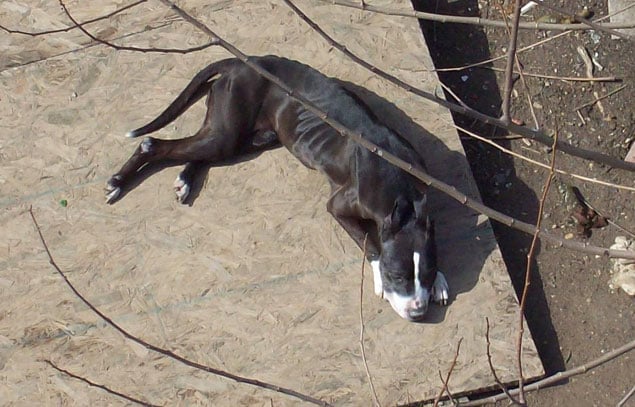Update: Thank you to all the commenters for their concern. But please do not seek to take action yourselves. Since posting the story, I’ve gotten a great response from officials within Mayor Gray’s office, as well as the DC Council member for my ward, Kenyan McDuffie. The Humane Society of the United States is also now looking into the situation. I sincerely appreciate your intentions, but I am hopeful this situation can be resolved legally.
I knew the dog would be an issue from the second I saw her. My husband and I had been condo hunting for months when we finally found the place that felt like it could be home. It was one of four units in a newly renovated rowhouse in DC’s Bloomingdale neighborhood. But the dog that I could see through the fence next door gave me real pause.
Her yard was a mess—covered in feces and random debris. She didn’t seem to have much shelter, and I couldn’t see bowls for water or food. Most alarming—she didn’t look well. She was thin, and her constant barking told me she was seriously stressed. Who knew how long she had endured these conditions? The condo building, which has a direct line of sight into her yard, had been vacant for years before a developer came through and remodeled it. Maybe no one had noticed this poor dog before.
I love animals. I mean, I really love them—especially dogs. And I knew that buying this condo would come with the heartbreaking task of trying to help this one. But we signed on the dotted line, and now here we are, a year later. The dog’s yard conditions have not improved. Her health is severely deteriorating. Her ribs, as well as her hip- and backbones are clearly protruding. I have lost sleep over her. I have shed many tears for her. The other residents in my building have, too.
Let me be clear: I am a huge supporter of the Washington Humane Society (WHS), which cares for 30,000 of the District’s animals every year, and whose officers are responsible for enforcing DC’s animal-cruelty laws. I have been a volunteer dog-walker at the WHS’s Georgia Avenue shelter, I regularly donate to the organization, and we adopted both our dog our and cat there. But it’s precisely because I have so much respect and admiration for the work that the folks at WHS do that I’ve been so shocked by their failure to help the dog next door.
Immediately after spotting the dog, I began calling WHS’s animal-emergency line to report her conditions. My neighbors have continuously called about her as well. I’ve filed multiple reports with the city about the unsanitary conditions in her yard. I’ve had one conversation with her owner: I politely tried to express my concern, but it was not all well received. I know Humane Law Enforcement officers from WHS have visited her house dozens of times, and yet nothing ever comes of those visits. In conversations with the lead officer assigned to her case, I’ve been repeatedly told that while her situation is bad, it’s not bad enough for law enforcement to intervene. To me and the other residents of my building, this is simply unfathomable. When I spoke with the officer a couple of weeks ago, he mentioned that even if he impounded the dog, she would likely never find another home, so taking her might not be in her best interest anyway.
She is a pit bull—a breed so unfairly maligned and stigmatized that animal shelters overflow with them—and she could be dangerous, since she has clearly never been trained or socialized. Indeed, this doesn’t bode well for her. But I’ve seen firsthand how dedicated and loving the staff is at WHS’s shelters. Surely, even if she’ll never have a comfortable home of her own, being surrounded by humans who actually care would be a small measure of justice for a dog that currently knows only hunger and neglect.
And I’m not convinced that she’s dangerous. For a while, I fed her dog food through her fence. She would eagerly wag her tail when she saw me approach, sniff me through the chain-link, and gobble up the kibbles. But I’ve been told by Humane Law Enforcement to stop feeding her. They say they’ll never be able to build a case for taking her out of her situation if the neighbors are keeping her healthy.
So now, I feel as though I’m totally powerless, which is why I’m writing about her. It seems like the only thing left to do.
When I told the WHS media spokesperson that I planned to write about this dog’s plight, she immediately put me in touch with Scott Giacoppo, the organization’s vice president of external affairs. He outlined the laws that his officers must operate under. In short, he said, “We’re dealing with law, not common sense.” And as I now know, that’s a huge understatement.
For starters, though they’re deplorable, the dog’s yard conditions don’t meet the legal standard of cruelty because she is not forced to lie in her own waste. Giacoppo described a cruelty case brought by WHS against an animal hoarder who kept cats in a home where feces covered the floor. Because the cats were able to jump on top of a dresser and away from the waste, WHS lost the case.
And almost anything, even a shabby piece of plywood propped against a fence, counts as adequate outdoor shelter for a dog, under the law. Though the dog next door is not kept outdoors 24 hours a day, she spends hours on end in her yard, even in subfreezing weather. When DC’s temperatures dipped into the teens and twenties this winter, my neighbors and I called to report that the dog—who has a very short coat—had been left outside. But guess what? That doesn’t necessarily meet the cruelty standard either.
But what about the dog’s physical condition? This is where Humane Law Enforcement’s rationale for failing to intervene loses credibility with me. Giacoppo says that, under the law, an animal must have “protruding ribs, backbone, and sunk-in hips” to be impounded. When I look at the dog next door, all I see is how skeletal she’s become. I see an animal that’s dying, but apparently it hasn’t gotten bad enough.
The Washington Humane Society handles an average of 1,400 cruelty investigations per year. The organization’s budget is reliant on donations. Until recently, there were only three Humane Law Enforcement officers policing all of DC. A fourth officer was just added. Even with limited funding, the organization does great things, including its recent seizure of dogs from a fighting operation.
I get it—resources are slim and demand is high. But the dog next door needs help. And nobody seems willing to provide it.
Marisa M. Kashino covers law and lobbying as a staff writer for Washingtonian, and also edits the magazine’s Pets coverage. She and her husband live in Bloomingdale with their dog, Bexley, and their cat, Olive.











